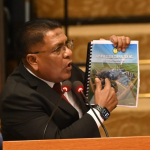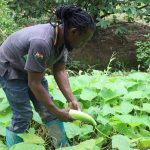To tackle food insecurity in the Caribbean and Latin America, collective efforts must be taken to build a more resilient, sustainable and inclusive agriculture food system.
This was underscored by Minister of Agriculture, Zulfikar Mustapha during his remarks at the Community of Latin American and Caribbean States (CELAC) high-level Ministers of Agriculture meeting, at the Arthur Chung Conference Centre (ACCC) on Tuesday.
“By collaborating and sharing our experiences and knowledge, we can effectively tackle the pressing issues impacting our agriculture sectors. Our discussions have the potential to create lasting impacts that will benefit our nations for generations to come,” Minister Mustapha stated.
The forum provided the opportunity to update the CELAC’s plan to address food insecurity and nutrition in light of the present situation, while allowing for the national commitment towards the Sustainable Development Goal of zero hunger.
“The agenda before us…will allow us to deliberate on the progress of the CELAC food security plan and how the implementation of the regional initiative like the CARICOM agri-food system agenda will help the region to reduce food insecurity,” the agriculture minister added.
He stated that this is important given the high level of food insecurity in the region, which continues to be an area of concern.
The meeting marks an important milestone in the region’s collective pursuit of strengthening food and nutrition security in Latin America and the Caribbean region.
The ultimate goal of the CARICOM initiative is to achieve the ambitious but attainable goals of increased sustainable production and food system transformation for a 25 per cent reduction in food importation by 2025. The initiative also aims to build resilience against climate change.
“We continue to witness firsthand the rising frequency of extreme weather events, the decline of our natural resources, and the mountain pressures on food production and the distribution system,” Minister Mustapha asserted.
The COVID-19 pandemic and the Russia-Ukraine conflict, which continue to affect not only the region but the world due to disruptions to the food supply chain, are other recent events that have contributed to the region’s food insecurity.
“As we embark on this collective journey, let us remember the lives that are at stake and the communities that depend on our actions. Our task is not an easy one but it is essential. Let us engage in fruitful discussions, exchange valuable insights, and forge strong partnerships, that will facilitate the transformation of our agricultural food systems,” Minister Mustapha stressed








